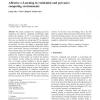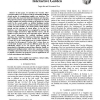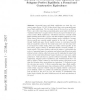790 search results - page 143 / 158 » Second life and education |
CORR
2006
Springer
13 years 7 months ago
2006
Springer
We investigate here concept learning from incomplete examples. Our first purpose is to discuss to what extent logical learning settings have to be modified in order to cope with da...
ISF
2008
13 years 7 months ago
2008
This article examines how emerging pervasive computing and affective computing technologies might enhance the adoption of ICT in e-Learning which takes place in the home and wider ...
CORR
2007
Springer
13 years 7 months ago
2007
Springer
The social media site Flickr allows users to upload their photos, annotate them with tags, submit them to groups, and also to form social networks by adding other users as contact...
IJVR
2006
13 years 7 months ago
2006
In this paper, we introduce the "Garden Alive" system that allows users to interact with an emotionally intelligent virtual garden by manipulating tangible user interface...
CORR
2007
Springer
13 years 7 months ago
2007
Springer
Abstract. Sequential game and Nash equilibrium are basic key concepts in game theory. In 1953, Kuhn showed that every sequential game has a Nash equilibrium. The two main steps of ...



